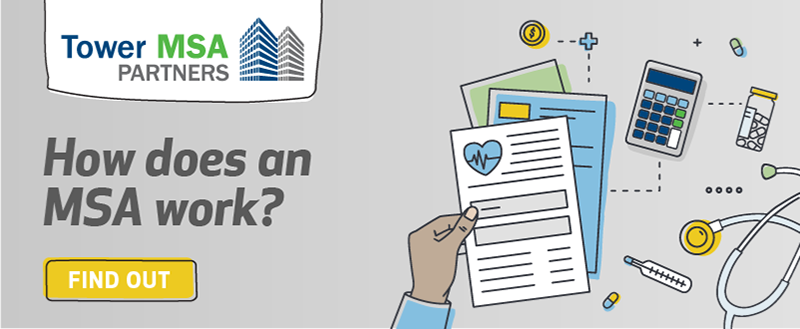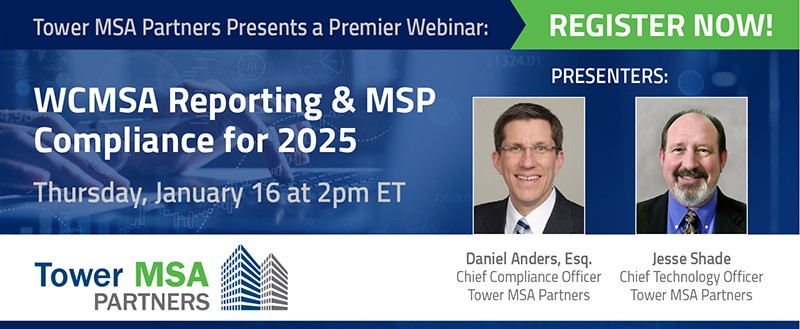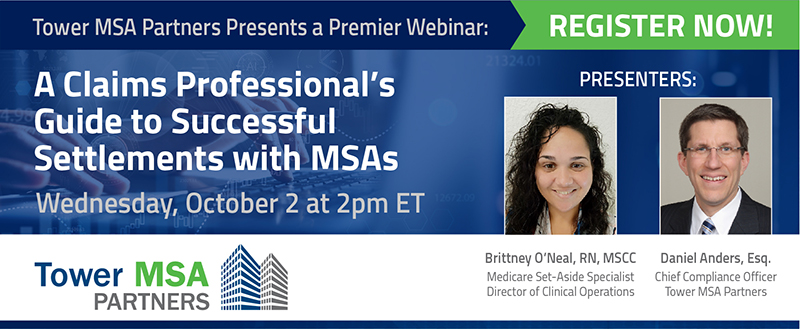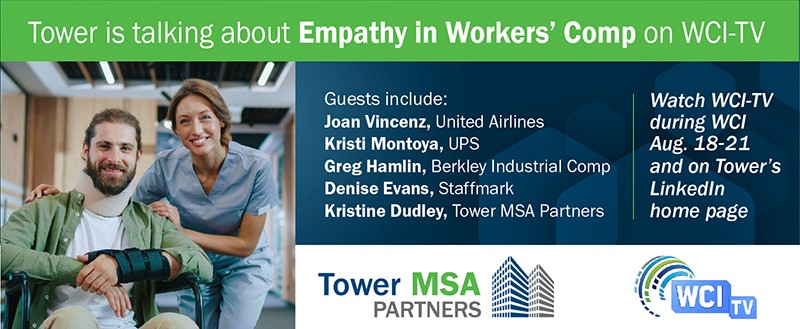Second Installment in Our Tower MSA Partners Series
At Tower MSA Partners, we understand that navigating a Workers’ Compensation Medicare Set-Aside (WCMSA) can seem complex. It is an unavoidable complexity as the Medicare Secondary Payer Act provides that medical expenses related to a workers’ compensation injury cannot be shifted onto the Medicare program. In this installment, we break down the process into clear, actionable steps—from determining the amount of an MSA to securing the Centers for Medicare & Medicaid Services (CMS) approval and finally funding the account. Let’s walk through each stage.
Determine the WCMSA Amount
This consists of a medical and legal review of relevant claim documents by your MSA partner to determine the appropriate amount to fund the account:
- Medical History Review:
A thorough review of the injured worker’s medical records, treatment plans, and projected future medical treatments, including surgeries, and DME is conducted. This detailed analysis helps estimate the expenses that Medicare would potentially cover over the worker’s lifetime. - Legal History Review:
If a $0 MSA is indicated or there are other bases to support an exclusion of diagnosis or treatments for legal reasons, then a legal history review is also completed. Such a review identifies valid support for limiting the MSA amount under state statutes. - Accuracy and Mitigation Opportunities:
The MSA should accurately reflect reasonably probable future medical care. Often, outdated and open-ended medical records and prescription histories result in unnecessary treatment and medications being added to the MSA. Your MSA partner should identify opportunities for mitigation and contact the treating physicians to clarify ongoing and future medical care. - MSA Report:
The comprehensive MSA report, prepared by your MSA partner provides the expected lifetime medical costs. The report should indicate the MSA calculated as a lump sum and as a structure (seed MSA amount and annual payments), so the parties have both options available. This report is an integral part of the submission to CMS, if needed, demonstrating that the WCMSA is properly funded.
By accurately determining the WCMSA amount, you ensure that the injured worker’s future healthcare needs are met without jeopardizing compliance.
CMS Review and Approval
After establishing the WCMSA amount, the next critical phase involves submitting the proposal for CMS review, if needed:
- Submission for CMS Approval:
CMS MSA review and approval is voluntary, but recommended in most cases, when the injured worker is a Medicare beneficiary, and the estimated settlement exceeds $25,000 or when the injured worker has a reasonable expectation of Medicare eligibility within the next 30 months and the estimated settlement exceeds $250,000. Work with your MSA partner to obtain the claimant executed Consent to Release form and answer required submission questions, such as estimated settlement amount, how the MSA will be funded (lump sum or annuity) and administered (See below). Once your calculations and documentation are in order, the WCMSA proposal can be submitted to CMS. This formal submission initiates the review process. - Review Process:
CMS will evaluate the proposal to confirm that the WCMSA is necessary and that the funding is sufficient. This includes verifying the documentation and ensuring that all criteria are met. - CMS Determination:
Upon successful review, CMS will issue a Determination Letter stating the approved WCMSA amount. CMS can approve the MSA as submitted or issue a counter-higher or lower. This letter is critical, as it validates that the MSA is sufficient to consider Medicare’s interests such that if the funds were to run out Medicare would step in and pay for injury-related medical expenses.
A smooth review process is achieved by meticulous preparation and prompt responses to any CMS queries.
Fund and Administer the WCMSA
The final step is to properly fund and administer the WCMSA according to strict regulatory guidelines:
- MSA Administration: Depending on what the injured worker agrees to, he or she can either choose to self-administer the MSA funds or have a third party MSA professional administration company administer the funds.
- Dedicated Interest-Bearing Account:
The approved WCMSA funds must be placed in a dedicated, interest-bearing account. - Purpose-Bound Use:
Funds in the WCMSA account must be used exclusively for medical expenses related to the workers’ compensation claim that Medicare would otherwise cover. This ensures that the funds remain available for their intended purpose. - Ongoing Compliance:
If self-administered, the beneficiary must submit an annual attestation confirming the proper use of the funds. Professional administration may involve additional oversight, such as periodic deposits and considerations for fund reversion.
Proper funding of the WCMSA not only fulfills CMS requirements but also secures the injured worker’s future medical care.
Conclusion
Navigating a Workers’ Compensation Medicare Set-Aside is a detailed process that involves assessing the need, determining the correct funding amount, securing CMS approval, and ensuring proper fund management. At Tower MSA Partners, our commitment is to guide you through every step, ensuring that your WCMSA complies with all regulatory standards while safeguarding the healthcare needs of injured workers.
For more insights or assistance with your WCMSA process, feel free to reach out to our team. Stay tuned for our next installment, where we explore guidelines for determining when an MSA is required and best practices for compliance.











